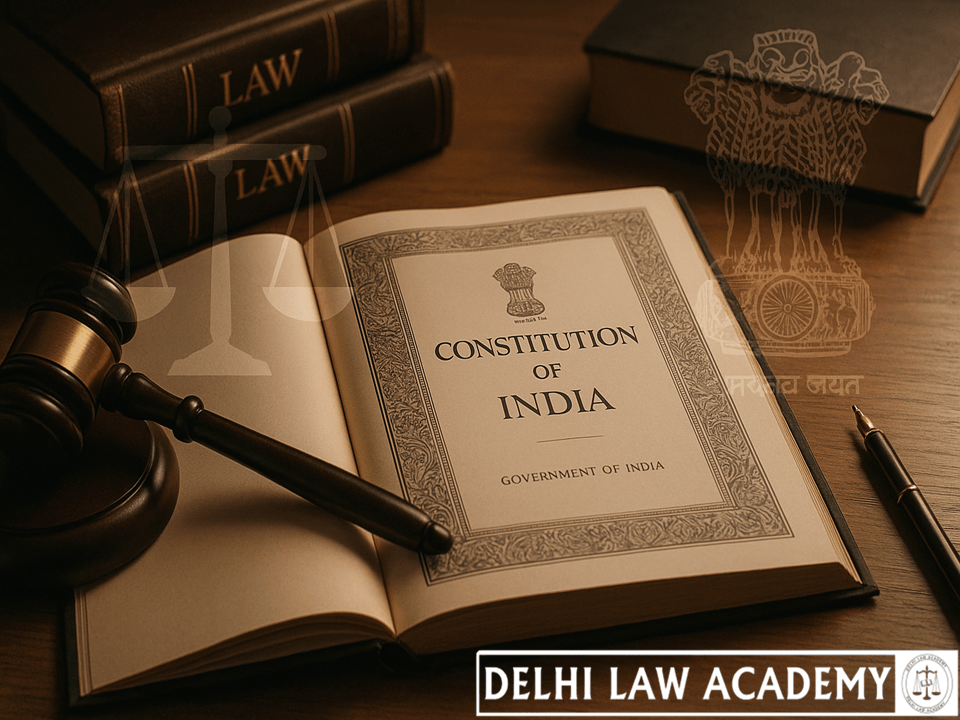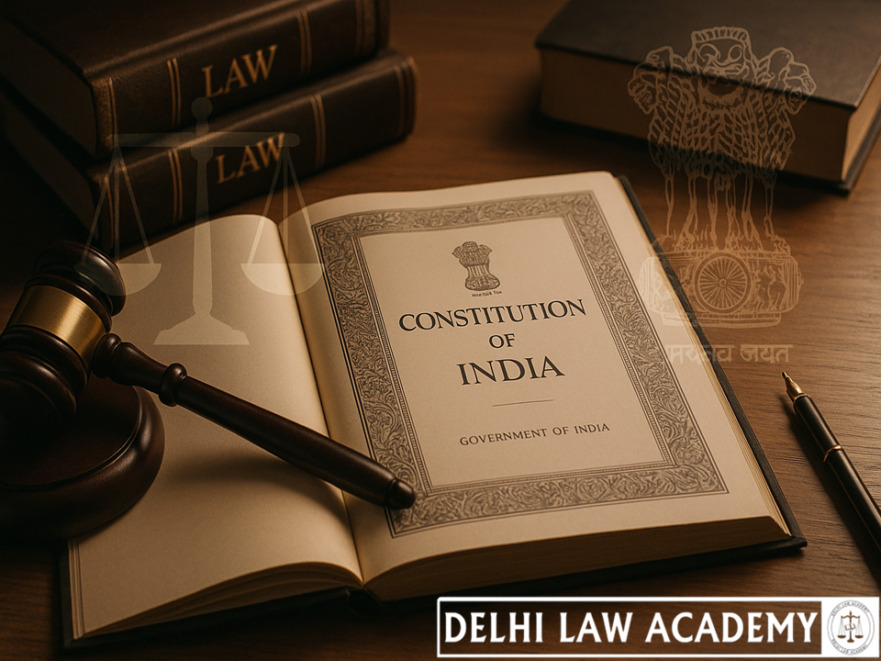
📘 Official Languages & Miscellaneous Provisions – Articles 343 to 351 & 361 to 367
Delhi Law Academy Jaipur presents below for aspirants of RJS, DJS, PCS (J) and other Judicial Services throughout India a simplified Note on provisions relating to Official Languages and other miscellaneous provisions.
🗣️ OFFICIAL LANGUAGES
📜 Constitutional Provisions
OFFICIAL LANGUAGES
ARTICLES 343 – 351
Article 343 Official language of Union
- Official language of Union
- shall be Hindi in Devanagari script
- Form of numerals
- shall be international form of Indian numerals
Use of English upto 15 years
- For 15 years from commencement of Constitution
- English shall continue to be used
- for official purposes of Union
- Parliament may by law
- provide for use of English beyond 15 years
Article 344 Language Commissions
- President shall constitute commissions
- after 5 years and after 10 years
- from commencement of Constitution
- with members representing different languages in Eighth Schedule
- It shall be duty of the Commission to make recommendations as to
- Progressive use of Hindi for official purposes of Union
- Restrictions on use of English for official purposes of Union
Joint Parliamentary Committee
- There shall be constituted a committee consisting of
- 20 members from House of People
- 10 members from Council of States
- This committee shall examine
- recommendations of Language Commission
- President may issue directions
- in accordance with that report
Article 345 Official language of a State
- State Legislature may by law
- adopt any one or more languages in use in State or Hindi
- to be used for official purposes of that State
- English shall continue to be used for official purposes
- until State Legislature otherwise provides by law
Article 346 Communication between States
- Official language of Union shall be the language
- for communication between States and
- for communication between Union and States
- If two or more States agree that
- Hindi should be used for communication between them
- that language may be so used
Article 348 Language of Higher Courts
- Until Parliament by law otherwise provides
- All proceedings
- in Supreme Court and
- in every High Court
- shall be in English
Language of Bills and Acts
- Until Parliament by law otherwise provides
- authoritative text
- of all Bills in Parliament or State Legislatures
- of all Acts passed by Parliament or State Legislatures
- of all Ordinances promulgated by President or Governor
- of all orders, rules and regulations under Constitution or any law
- shall be in English
Language in High Court
- Governor of a State may
- with previous consent of President
- authorize use of Hindi or other official language of State
- in proceedings in High Court of that State
- This clause shall not apply to
- any judgment, decree or order passed by High Court
Article 350A Instructions in mother tongue
- Every State and every local authority
- shall endeavour to provide facilities
- for instruction in mother tongue at primary stage of education
- to children of linguistic minority groups
- President may issue directions to any State
- necessary for securing such facilities
Article 350B Special Officer for linguistic minorities
- There shall be a Special Officer
- for linguistic minorities
- to be appointed by President
- He shall investigate all matters
- relating to safeguards for linguistic minorities
- and report to President
Article 351 Development of Hindi
- It shall be the duty of Union
- to promote spread of Hindi and
- to develop it
- so that it may serve as medium of expression
- for all elements of composite culture of India
⚖️ MISCELLANEOUS PROVISIONS
ARTICLES 361 – 367
Article 361 Protection of President and Governors
- President or Governor shall not be answerable to any court
- for exercise of powers and performance of duties of his office or
- for any act done by him in such exercise and performance
- Conduct of President may be reviewed
- during impeachment proceedings against him
Immunity from criminal proceedings
- No criminal proceedings whatsoever
- shall be instituted or continued against President or Governor
- during his term of office
- in any court
Immunity from arrest
- No process for arrest or imprisonment
- of President or Governor
- shall issue from any court
- during his term of office
Notice required for civil proceedings
- No civil proceedings
- shall be instituted against President or Governor
- during his term of office
- in any court
- for any act done by him in his personal capacity
- until expiration of 2 months
- after notice has been delivered to him
Article 361A Protection of publications
- No person shall be liable to any proceedings in any court
- for publication in a newspaper
- of a substantially true report
- of proceedings of Parliament or State Legislature
- unless publication is made with malice
- This provision shall not apply
- to publication of proceedings
- of a secret sitting of Parliament or State Legislature
- This provision shall also apply
- to matters broadcast by a broadcasting station
- as it applies to a newspaper
Note:
- Inserted by 44th Amendment Act, 1978
Article 362
- Note: Repealed by 26th Amendment Act, 1971
Article 363A
- A Prince or other person
- recognized so far by President as ruler of an Indian State
- shall cease to be recognized as such ruler
- from commencement of the 26th Amendment Act
Article 365 Failure to comply with Union directions
- Where a State has failed to comply with
- directions given by Union Executive
- it shall be lawful for President
- to hold that a situation has arisen
- in which govt of State cannot be carried on
- in accordance with provisions of this Constitution
Article 366 Definitions
Anglo-Indian:
- A person
- whose father or any other male progenitor was of European descent and
- who is domiciled in India and
- who is born in India of parents habitually resident in India
Existing law:
- Any law, order, rule or regulation
- made before commencement of Constitution
- by any legislature, authority or person having power to do so
Public notification:
- A notification
- in Gazette of India or
- in official gazette of a State
Article 367 Interpretation
- General Clauses Act 1897 shall apply
- for interpretation of this Constitution
- as it applies
- for interpretation of an Act of legislature
📘 Stay Ahead with Delhi Law Academy!
Get access to free monthly current affairs, read our insightful blogs,
and explore free study resources prepared by experts at DLA Jaipur. 🚀
❓ FAQs on Official Language & Miscellaneous Provisions
🗣️ What is the official language of India under Article 343?
Article 343 states that the official language of the Union shall be Hindi in the Devanagari script. It also specifies that the international form of Indian numerals will be used. English may continue for official purposes for 15 years and further if Parliament so decides.
📜 What is the role of the Language Commission under Article 344?
The Language Commission, constituted after 5 and 10 years from the commencement of the Constitution, recommends the progressive use of Hindi, restrictions on English, and advises on language-related matters. Its recommendations are reviewed by a Joint Parliamentary Committee.
⚖️ Why are Supreme Court and High Court proceedings in English (Article 348)?
Article 348 mandates that all proceedings in the Supreme Court and High Courts must be in English until Parliament provides otherwise. It ensures uniformity and clarity across jurisdictions. State languages may be used in High Court proceedings only with Presidential consent.
👶 What does Article 350A say about mother tongue education?
Article 350A requires every State and local authority to provide facilities for primary education in the mother tongue of children belonging to linguistic minority groups. The President may issue directions to ensure compliance.
📰 What protection does Article 361A give to newspaper publications?
Article 361A protects individuals from legal proceedings for publishing substantially true reports of parliamentary or state legislative proceedings, unless done with malice. It applies to newspapers and broadcasting stations but excludes secret sittings.
🏛️ What happens if a State disobeys Union directions under Article 365?
Article 365 states that if a State fails to comply with Union Executive directions, the President may hold that a situation has arisen in which the government of the State cannot be carried on in accordance with the Constitution, enabling central intervention.
Contact us
📍 Delhi Law Academy – Jaipur Branch
6C, Tower 2, Coaching Hub, Pratap Nagar, Jaipur – 302033
📞 Phone:
+91 9911916552
+91 8447285606
✉️ Email:
contactus@delhilawacademy.com

